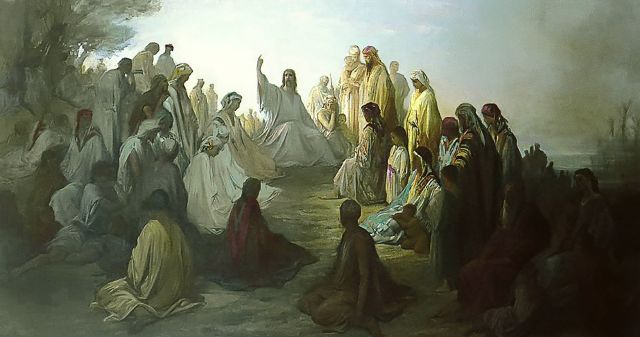"Blessed Are Ye"

February 13-19

FAIR Faithful Resources for Come, Follow Me 2023 February 13–19 Matthew 5; Luke 6 “Blessed Are Ye.” Find answers to difficult questions to help you in your learning and teaching. Here is a collection of reliable resources to supplement your study of Matthew 1 and Luke 1. FAIR Resources link to relevant questions which have been answered on the FAIR website. Under Church Resources you’ll find links to the different Come, Follow Me manuals, as well as other helpful links as applicable. Other Resources link to resources outside of FAIR that are trustworthy and helpful.
Main points to ponder
Beatitudes and the Sermon on the Mount: Blessed Are Ye
The Beatitudes (from the Latin beatus meaning “blessed”) are a series of teachings that Jesus gave in the Sermon on the Mount that describe a refined and spiritual character (Matt. 5:3–12; Luke 6:20–23). The Beatitudes are arranged in such a way that each statement builds upon the one that precedes it. A more comprehensive and accurate record of the Beatitudes is found in 3 Ne. 12.
The Sermon on the Mount, Matt. 5:1–7:29 is a discourse by the Lord to His disciples who were about to be sent forth on missions. It should be placed chronologically soon after the calling of the Twelve. It is similar in many respects to a sermon recorded in Luke 6:20–49, although the Matthew account contains more pointed references to the law, the prophets, and the individual calling and responsibility of the disciples. The Luke account appears to have a more general application. For example, “Ye are the salt of the earth” (Matt. 5:13); “Ye are the light of the world” (Matt. 5:14); and, “take no thought, saying, What shall we eat … drink? or, Wherewithal shall we be clothed” (Matt. 6:31) do not occur in the Luke account. The Sermon in Matthew is greatly clarified by the JST (compare the KJV to the JST here for Matthew 5 and here for Luke 6) and a similar sermon recorded in 3 Ne. 12–14.

Faithful Resources on the FAIR website:
- The Sermon on the Mount in the Book of Mormon
- Translation errors in the King James Bible appearing in the Book of Mormon
- The “Joseph Smith Translation” of the Bible
- Joseph Smith’s corrections to the Bible do not match known Biblical manuscripts
- Use of the Joseph Smith translation of the Bible
- Relationship of the Joseph Smith Translation of the Bible to the Book of Mormon
- Relationship of the Joseph Smith Translation to the Book of Abraham
- Accusations of Plagiarism Leveled Against the Joseph Smith Translation of the Bible
- Question: Do Mormons ignore the doctrine of grace at the expense of “works”?
- Question: How do Latter-day Saints approach authorship of New Testament books?
Faithful Resources on the Church website:
Come, Follow Me—For Individuals and Families
Come, Follow Me—For Sunday School
Lesson 8: New Testament Customs—Schoolmaster
Sermon on the Mount: The Beatitudes (Matthew 5:3-16)
Sermon on the Mount: The Higher Law (Matthew 5:17-48)
Faithful Resources from other reliable websites:
The Interpreter Foundation
- Come, Follow Me Study and Teaching Helps — Lesson 8: February 13–19, John Claybaugh
- The New Testament in Context: Come, Follow Me Lesson 8
- Lasting Happiness Comes from Living the Way Jesus Christ Taught, Hales Swift
- Audio Roundtable: Come, Follow Me New Testament Lesson 8
- Not Just Sour Grapes: Jesus’s Interpretation of Isaiah’s Song of the Vineyard by John Gee
- Luke 4-6 and Matthew 10. Faithfully Responding to God’s Call, Taylor Halverson
- Scripture Roundtable: New Testament Gospel Doctrine Lesson 6, “They Straightway Left Their Nets”
- Scripture Roundtable: New Testament Gospel Doctrine Lesson 8, The Sermon on the Mount: “A More Excellent Way”
BYU Studies/RSC
- Israel’s Ancient Psalms, Andrew C. Skinner
- A Scriptural Comparison Concerning Anger: 3 Nephi 12:22 and Matthew 5:22, Daniel K. Judd
- Salt and Light, Matthew O. Richardson
- “What Therefore God Hath Joined Together, Let No Man Put Asunder”, Richard D. Draper
- “Resist Not Evil”, Daniel K. Judd
- “As Your Father Also Is Merciful”, Nicholas J. Frederick
- “A Wise Man Built His House upon a Rock”, Daniel L. Belnap
- The Sermon on the Mount in the Joseph Smith Translation, David A. LeFevre
- The Sermon on the Mount in the JST and the Book of Mormon , Robert A. Cloward
- The Six Antitheses, Eric D. Huntsman
- How New Testament Variants Contribute to the Meaning of the Sermon on the Mount, Thomas A. Wayment
Other Helpful Sources
- Come Follow Me – Matthew 5; Luke 6, Book of Mormon Central Archive
- Tyler Griffin & Taylor Halverson Matthew 5; Luke 6 | Feb 13-19 | Come Follow Me Insights
- Lynne Hilton Wilson Matthew 5, Luke 6: New Testament with Lynne Wilson (Come, Follow Me)
- John Hilton III : Jesus and The Beatitudes, Christ Raises the Bar, Jesus and Anger, Jesus and Lust, and Jesus and Perfecting Love
- Follow Him: Feb 13 – Feb 19, Dr. Lincoln H. Blumell “BLESSED ARE YE” Part 1, Part 2, Youth
- The Scriptures are Real: Jan Martin on the Beatitudes and Becoming; Roger Hoffman on composing “Consider the Lilies of the Field”; Little realities in the Sermon that bring it to life (week of Jan. 13, third to watch)
- Understanding the Sermon on the Mount, Messages of Christ
- Our Savior in the Gospels: Matthew 5-7: The Beatitudes
- Our Savior in the Gospels: Matthew 5-7: Sermon on the Mount
- Our Savior in the Gospels: Luke 5-6: The Calling of the Twelve
Lasting happiness comes from living the way Jesus Christ taught. Blessed Are Ye – Matthew 5:1–12; Luke 6:20–26, 46–49 How is this different from the world’s view of happiness? What do these verses, together with Luke 6:46–49, teach you about being a disciple of Jesus Christ?
“Ye are the salt of the earth.”
Matthew 5:13; Leviticus 2:13; Numbers 18:19; See also Doctrine and Covenants 103:9–10.
The law of Christ supersedes the law of Moses.
Matthew 5:17–48; Luke 6:27–35; Why do you think the Savior’s way is a higher law? For example, what did Jesus teach in Matthew 5:27–28 about our responsibility over our thoughts? How can you gain more control over the thoughts and feelings that come into your mind and heart? (see Doctrine and Covenants 121:45).
Does Heavenly Father really expect me to be perfect?
Matthew 5:48; Doctrine and Covenants 67:13. See also 2 Peter 1:3–11; Moroni 10:32–33; Doctrine and Covenants 76:69; Jeffrey R. Holland, “Be Ye Therefore Perfect—Eventually,” and Russell M. Nelson, “Perfection Pending,”

Faithful Resources Faithful Resources Faithful Resources Faithful Resources Faithful Resources Faithful Resources Faithful Resources Faithful Resources Faithful Resources Faithful Resources Faithful Resources Faithful Resources Faithful Resources Faithful Resources Faithful Resources Faithful Resources Faithful Resources Faithful Resources Faithful Resources Faithful Resources Faithful Resources Faithful Resources Faithful Resources Faithful Resources Faithful Resources Faithful Resources
